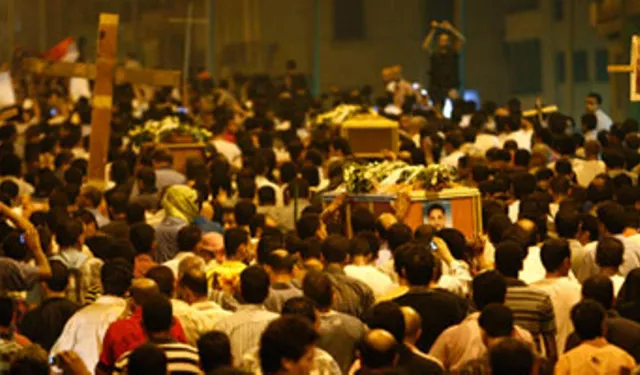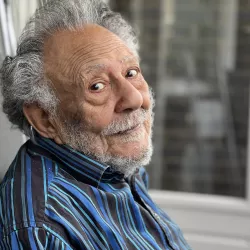
Remembering a Massacre| Maspero: Notes on the script of religious bigotry
At a time of seemingly endless massacres, Al Manassa remembers the brutal killings of protestors outside the state television building, Maspero. Shot or crushed by the very institution to which the people had held out its hand in 2011: the Egyptian armed forces.
It is never simple for a “Christian” Egyptian writer to tackle, let alone dwell in, the subject of religious tension and bigotry in Egypt without also interrogating, again and again, the very act of speaking—of setting down words that might themselves be used as evidence against the speaker.
To begin with: if writing is to be honest and its intentions clear, we must admit — with shame, with anger, with sorrow and regret — that religious intolerance in Egypt is as old as the conquest of Egypt by the army of Amr Ibn Al-Aas, more than a thousand years ago.
I choose, deliberately, the Islamic term “conquest/fath” rather than “invasion/ghazw”, because the Arab/Islamic occupation of Egypt then served twin purposes: first, to found an Islamic empire roughly 15 years after the Prophet’s death, and second, to disseminate a faith that from its inception fused religion and state.
With Christian roots, I learned prejudice in two registers: first as creed, then as ethnicity. From the day I grasped, as a child in Sudan, that I belonged to a minority faith, the sense of standing apart from “the majority” burrowed into me and never left.
Now, as an Arab living in the West, I am once more—without consultation or consent—assigned to a minority. The pattern repeats itself with chilling efficiency: in Sudan, a religious and ethnic minority; in Europe, an ethnic one. Thus prejudice revealed to me both of its faces, the bared teeth and the powdered smile. The former is easier to resist; the latter carries the same poison in fine glass.
The shock of the massacre
When the Maspero massacre occurred, I was at home in Amsterdam, watching it unfurl on European television. Horror struck—and I filed it away, deep. I have a chamber inside, a quiet vault where I place the things that would otherwise unbalance me, personally and politically.
I have been politically active since I was eighteen, in 1955. Approaching eighty, I hold to an old decision: I am not a practicing believer. Long ago, my wife and I agreed we would not impose religion on our children, as our parents did on us. They would be free—when they understood enough—to choose any faith, or none.
Why am I lingering here? I am not required to bare my soul to the reader, and yet I do.
Months later I traveled to Aswan and, as always, sought out my old friend Youssef Fakhouri — my indebted gratitude to him still intact for having once opened Aswan’s doors of writers and artists: Ahmed Abou Khnegar, Osama al-Banna, Qismet Katoul.
This time I found him diminished — not only in body but in spirit.
He was never a man to speak easily about his feelings; at last he confessed he had been unwell since he watched the massacre live. In his modest apartment he had collapsed from his couch while the horror played out on Egyptian television.
Forgive me — I pushed the massacre aside once more. I had just finished my penultimate novel, “Zujaj Mu‘ashshaq/Stained Glass”, and I felt the exhaustion of writing that comes with age — and a deep reluctance to confront what I knew was, for me, a taboo: to lay bare my political and creative position by bringing sectarian tension and religious intolerance into a work of art, or even into a political essay.
“Whoever burns his tongue on soup blows on yoghurt”. The proverb had my number. Still, I wanted to write a novel about January 25. I collected testimonies; I read analyses; I did the work.
I resolved to keep religion out. But like Jonah, I found myself swallowed whole. My conscience—the only “god” I still consult—ordered me to face it. I did. I came out of the belly of the whale shaken, and decided to write everything I knew about the revolution and the massacre alike.
I wanted the “eye of the storm” of religious intolerance in Egypt. I went back to early Islamic history and to the concept of “ahl al-dhimma/non-Muslims living under Islamic rule”. I read Egyptian Muslim historians—Sayyida Ismail Al-Kashif, Howaida Abdel Azim Ramadan—and Mohamed Farid Abu Hadid’s classic Arabic translation of Alfred J. Butler’s work on Egypt’s conquest. Abu Hadid softened the title—turning Conquest into “fath/opening/liberation”—but his eloquence earned him his indulgence.
What emerged from the reading was an immense archive in which intolerance threads its way through Pharaonic, Coptic, and Islamic eras alike. My conclusions were several, and they converged: intolerance is not an anomaly but a structural feature of the three “Abrahamic” faiths, each claiming divine sanction by invalidating what came before. As James George Frazer observed in “The Golden Bough,” the slide from “prophet-ruler” to “ruler-prophet” is not a miracle but a human habit.
Bigotry, I realized, ignites when power permits it; Egyptian rulers, across epochs, have kept the matches within reach.
Under Al-Hakim bi-Amr Allah, zealots were licensed to persecute Christians: brass crosses forced upon them, women made to wear mismatched shoes, churches and monasteries demolished, property confiscated.(*)
And has that spirit vanished in the twenty-first century? Hardly. We still hear of Christian homes burned, families expelled, women publicly humiliated in villages across Upper Egypt.
All this happen, despite an arsenal of laws to protect national unity and prohibit contempt of religion, etc. Why are these laws not implemented—why obstructed and frozen instead? Because the state itself, with its flabby structure—from the lowest watchman to some governors and security directors, as we saw in Minya—chokes them at birth.
Why does the state prefer customary reconciliation sessions to the law in sectarian disputes? To “tame” the Coptic Christians, quite simply; to motivate their support for the state and its ruling system by teaching them that danger is imminent, on their threshold; that enemies gather; that the state is their only shield—though the logic defeats itself. This is the same state that has long fought Islamist extremists in Sinai and the specialized wings and cells of the Muslim Brotherhood throughout the Nile Valley.
These are also coded messages to the West — Christian and human-rights-minded alike — that Egyptian Christians live under threat from religious groups, armed or otherwise, and that this is a long war, one that will go on for years to come.
Therefore, it is not the hour, they imply, for the West to lecture on human rights. The President’s statements on the matter are on the record.
Paradoxical as it may seem, during Nasserism—despite the execution of some Muslim Brotherhood leaders—Coptic Christians were not threatened as they would be after his death. Sectarianism erupted under his successor Sadat, who styled himself “a Muslim president of a Muslim country,” and Zawiya Al-Hamra followed.
The relative absence of sectarian outbursts in Nasser’s time, I think, derived from a people consolidated against external threat. “No voice louder than the voice of battle,” they said. The state—fragile though it was—had an existential war to wage.
This is the core of my claim: the Egyptian state, as political machine and bureaucratic habit, bears fundamental responsibility for violent sectarian eruptions. “Renewing and revolutionizing religious discourse”—Islamic or Christian—will remain performative so long as a certain logic sits ossified inside the state: “Punish one group to terrify the rest.”
Maspero was no exception. The Supreme Council of the Armed Forces was then in charge; the state broadcaster—under army protection—spent hours accusing Copts on air of attacking soldiers, urging citizens to “defend their army.”
What provocation could be greater?
I did not vote for Mohamed Morsi or his allies. I voted for Ahmed Shafiq because he represented the state, not divine authority. I believe most Christians made the same calculation, convinced—as I remain—that only a strong state can offer real protection to Egypt’s religious and ethnic minorities.
Unprecedented censorship
When I finished my novel in 2016, I placed detailed references at the end of each chapter. One cited the military’s virginity tests carried out in the Egyptian Museum on detained female protesters during the Tahrir protests. My publisher, Dar Al-Ain, asked me to delete the reference, which contained links to official military statements and to the women’s testimonies. I agreed, thinking the events remained alive in public memory.
Later, the publisher asked me to remove the Egyptian National Council for Human Rights’ report on the Maspero massacre, including state TV’s incitement led by anchor Rasha Magdy, who falsely claimed that Copts attacked the army. I had reprinted the full report. I agreed to delete it after being informed that the publishing industry in Egypt had “a line that cannot be crossed.”
Even the printing-press workers objected to a paragraph in my introduction thanking the gods of my ancestors—Isis, Osiris, Horus. They threatened to report the book to “the security” unless I removed the line, declaring, “There is no god but Allah.”
A compromise—brokered by Fatma El-Boudy, founder of Dar Al-Ain—allowed me to keep the names of Sayyida Zeinab and Sidi Abu Al-Hasan Al-Shadhli in the dedication, and to write, “to my ancestors who carried their identities proudly and remained in Egypt.”
That was the first time I truly feared the “Egyptian State” I had voted for. Its security apparatus had swollen grotesquely, eroding even the small freedoms promised by the constitution. I had not encountered such restrictions—not even under Morsi, during whose presidency I published my dialogues with the scholar Nasr Hamid Abu Zayd.
From what I witness, the ceiling of permissible expression in Egypt today is lower than under either Mubarak or Morsi.
Such is our reality, and it grieves me.
Amsterdam, Oct. 7, 2016
(*) Ahl Al-dhimma fi Al-asr Al-fatimi Al-awwal, Salam Shafie, History of the Egyptians 75, GEBO, 1995 (**) A version of this article first appeared in Arabic Oct. 15, 2016
Published opinions reflect the views of its authors, not necessarily those of Al Manassa.
